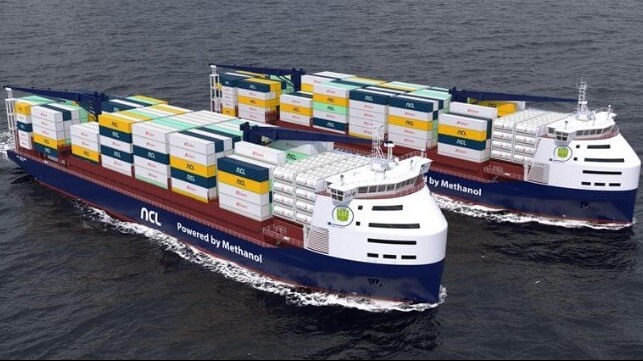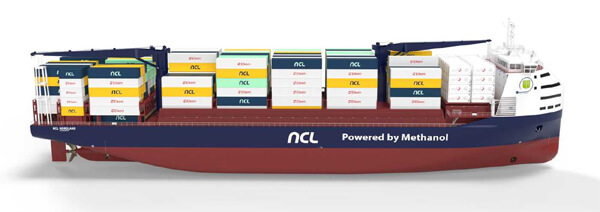Two Methanol-Fueled Feeder Ships to Launch North Sea Green Corridor

MPC Container Ships is working with North Sea Container Line to launch the first green corridor along the North Sea with the deployment of Norway’s first methanol-powered containerships. The companies plan to launch the vessels in the second half of 2024 and expect that they can cut net CO2 emissions by 45 percent and increase it up to 100 percent through the use of green methanol derived from renewable electricity and captured CO2 when the e-fuel becomes readily available.
The order for the two new containerships was placed by Germany-based MPCC which will own 90 percent of a newly created holding company. Topeka MPC Maritime, a partnership between MPC Capital and Wilhelmsen Group focused on decarbonized shipping, will hold the remainder. The two containerships, which will each have a capacity of 1,300 TEU, will be built at China’s Taizhou Sanfu Ship Engineering.
Each of the vessels will be outfitted with dual-fuel engines designed to operate on methanol as well as conventional MGO. Each will cost $39 million to build, and upon completion they will be chartered for 15 years to North Sea Container Line. The Norwegian short-sea operator plans to use the vessels to phase out the operation of three of its older diesel-powered vessels, which provide regular service between various ports in Norway, Rotterdam, and Hamburg. It is part of the company's plan to complete its transition to decarbonize its operations. NCL acknowledges that methanol will have a higher operating cost, but says it will become the default choice for its operations, and customers will have to explicitly request diesel-fueled ships if they want to go the slightly cheaper route.

Each of the Chinese--built vessels will have a capacity of 1,300 TEU for North Sea operations (NCL)
Also joining in the unique project will be Sweden’s Elkem, which develops and sells a range of silicones and silicon products, as one of several companies that will have freight contracts for transport on the new vessels. Elkem explains that its operations require a significant amount of transport with sea transport being one of the best means to move bulk goods. Under an agreement with NCL, the company will use the vessels to transport its goods across the North Sea. Elkem said it is also exploring the potential for capturing CO2 from its Norwegian plants and turning the CO2 into methanol for downstream use.
According to the companies, in addition to the methanol-fueled power plant, the ships will also be highly automated. They are saying that this will enable higher efficiency and that they will feature several new safety measures to eliminate the risks of injury during operation.
“This newbuilding project is proof of how innovative projects that address the important green transition of the maritime industry can be executed in a way that they are also economically attractive if the right partners join forces,” said Constantin Baack, CEO of MPC Container Ships. “Combining NCL's regional expertise and competencies and the strive and commitment of Elkem and others on the cargo side with MPCC's unique execution capabilities and in-depth understanding of intra-regional trade and vessel designs has been the basis for this project."
Viewed as an important demonstration project, it has been awarded approximately $1.4 million by Enova, a fund set up by the Norwegian Ministry of Climate and Environment focusing on environmental projects. They have also been awarded approximately $6 million from the NOx fund, the Norwegian business sector's fund to reduce emissions.

that matters most
Get the latest maritime news delivered to your inbox daily.
MPCC’s vessels will follow a similar demonstration project announced last year by Maersk to establish the first methanol-fueled containership. Maersk in July 2021 announced the order of a 2,100 TEU feeder ship that it expects to take delivery on by mid-2023. The company said they planned to use this containership on Baltic shipping routes between Northern Europe and the Bay of Bothnia as a demonstration of methanol and learning from the smaller ship in advance of Maersk’s larger methanol containerships expected to start delivery also in 2024.
Maersk reported that it hoped its shipbuilding orders along with the projects to support the production of methanol would serve as an inspiration to other companies in the shipping industry. X-Press Feeder contracted at the end of 2021 for 16 containerships each with a capacity of 1,170 TEU that will also be outfitted with dual-fuel engines capable of operating on methanol. France’s CMA CGM also recently reported that it has ordered six containerships designed to run on methanol in addition to its continuing construction of LNG-fueled containerships.
